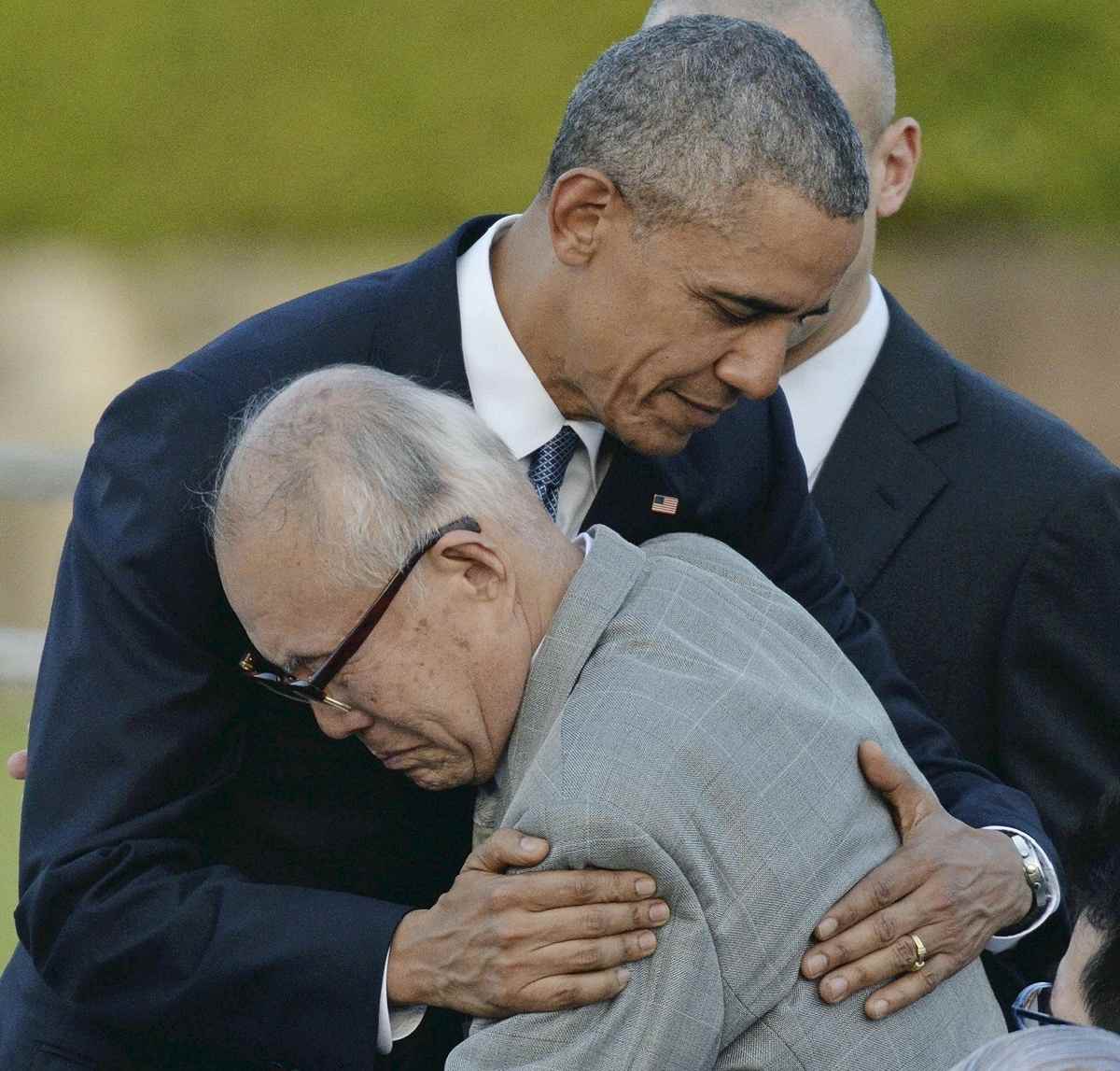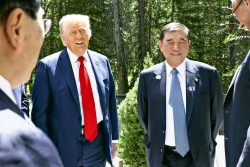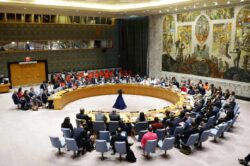
Then U.S. President Barack Obama hugs A-bomb survivor Shigeaki Mori in Hiroshima in May 2016.
15:45 JST, May 6, 2023
Japan is set to host a Group of Seven summit in the atomic-bombed city of Hiroshima later this month, amid concern over a rising threat that nuclear weapons could be used again. This is the second installment in a series focusing on what can be learned from atomic bomb survivors and others, while considering the ideals and realities of trying to achieve nuclear abolition.
***
Impatience, disappointment and hope are among some of the sentiments expressed by atomic bomb survivors ahead of this month’s G7 summit in Hiroshima.
When then U.S. President Barack Obama hugged atomic bomb survivor Shigeaki Mori at the Peace Memorial Park in Hiroshima on May 27, 2016, the encounter was portrayed as a symbolic step toward the abolition of nuclear weapons.
Mori, 86, gets emotional whenever he recalls that moment.
The first sitting U.S. president to visit Hiroshima said in a speech that day, “Among those nations like my own that hold nuclear stockpiles, we must have the courage to escape the logic of fear, and pursue a world without them.”
Mori had been invited to the event in recognition of his longtime research on U.S. POWs killed in the atomic bombing.
As Mori’s emotions got the better of him, Obama gently embraced him. Mori said he felt certain at that moment that there would be a shift “toward nuclear abolition.”
Seven years after that historic speech, however, the world seems to have taken the opposite path in Mori’s eyes.
A report released last year by the Stockholm International Peace Research Institute noted signs that the post-cold war decline in nuclear arsenals was ending. The number of nuclear warheads would probably increase for the first time since the end of the cold war in the next decade, according to the report.
In February, Moscow announced the suspension of the Treaty on Measures for the Further Reduction and Limitation of Strategic Offensive Arms (New START), a nuclear arms reduction pact between the United States and Russia. In addition, China is believed to be planning to increase its nuclear arsenal from 350 to 1,000 by 2030.
“The disappointment is greater because of the expectations [we had],” Mori said.
The average age of atomic bomb survivors is 84. “We don’t have much time left. This may be our last chance to urge the world to abolish nuclear weapons,” Mori said.
Low expectations
Terumi Tanaka, a 91-year-old survivor of the Nagasaki atomic bombing, also witnessed Obama’s speech in his capacity as secretary general of Nihon Hidankyo, a survivors’ association.
Tanaka was 13 years old when the atomic bombing killed five of his relatives.
In 2017, he became a representative of Hidankyo, taking part in efforts to abolish nuclear weapons.
He has talked about his experiences at U.N. disarmament conferences and other events, but feels the world is not moving forward, and the wishes of atomic bomb survivors are not being heard.
Tanaka said he understood what Obama was trying to convey in his speech seven years ago, but some things played on his mind.
“Seventy-one years ago, on a bright, cloudless morning, death fell from the sky and the world was changed,” Obama said.
The wording troubled Tanaka. “The atomic bombs did not ‘fall from the sky.’ The United States has obscured the fact that it dropped the bombs,” he said. “Is the U.S. really trying to address the feelings of survivors?”
The G7 includes the three nuclear powers of the United States, the United Kingdom and France, and allies that are protected by the U.S. nuclear umbrella.
Because of a belief among G7 members that nuclear weapons can deter attacks from other nations, Tanaka said he does not expect the summit in Hiroshima to make much progress toward nuclear abolition.
“The summit may end up merely affirming a policy of maintaining security through nuclear deterrence,” Tanaka said.
‘Turning point’
Toshiharu Kano, 77, a Utah resident who was among the guests that witnessed Obama’s speech has mixed feelings about the upcoming summit.
Kano’s mother was pregnant with him when the bomb was dropped on Hiroshima and her home was 800 meters from the hypocenter.
Kano said his pregnant mother had been holding her one-year-old son Toshio at the time of the explosion. Toshio died two months later.
When Kano was 15 years old, his family moved to America, but it wasn’t until the 1990s that Kano began opening up about his family’s experience.
His late wife Rita used to encourage him to share his stories, telling him that people need to know what he has gone through. Until her death in July of last year, she would find opportunities for him to tell others about his family story.
In April, he expressed an intention to continue speaking about his experiences, telling university researchers that he must not stop amid the growing threat of nuclear weapons.
Regarding Obama’s speech, Kano said he was moved because, toward the end, Obama talked about the struggles of Hibakusha survivors, but what was missing was “action.”
After the Hiroshima trip, Obama considered adopting a “no first use” policy for nuclear weapons, but decided against it, partly because of opposition from allied nations protected by the U.S. nuclear umbrella.
Obama left office eight months later without achieving concrete results.
Kano believes discussions can move forward at the summit because it is in Hiroshima, but he is aware that a difficult path lies ahead.
The G7 summit is like a “turning point,” he said.
Top Articles in Politics
-

Japan PM Takaichi’s Cabinet Resigns en Masse
-

Sanae Takaichi Elected Prime Minister of Japan; Keeps All Cabinet Appointees from Previous Term
-

Japan’s Govt to Submit Road Map for Growth Strategy in March, PM Takaichi to Announce in Upcoming Policy Speech
-

LDP Wins Historic Landslide Victory
-

LDP Wins Landslide Victory, Secures Single-party Majority; Ruling Coalition with JIP Poised to Secure Over 300 seats (UPDATE 1)
JN ACCESS RANKING
-

Japan PM Takaichi’s Cabinet Resigns en Masse
-

Japan Institute to Use Domestic Commercial Optical Lattice Clock to Set Japan Standard Time
-

Israeli Ambassador to Japan Speaks about Japan’s Role in the Reconstruction of Gaza
-

Man Infected with Measles Reportedly Dined at Restaurant in Tokyo Station
-

Videos Plagiarized, Reposted with False Subtitles Claiming ‘Ryukyu Belongs to China’; Anti-China False Information Also Posted in Japan
























